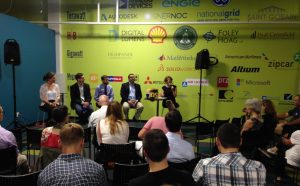 Somerville, Mass., September 10, 2015
Somerville, Mass., September 10, 2015
On September 10th, Greentown Labs hosted a panel on “Startups Solving Civic Problems” sponsored by Microsoft. The night focused on how innovative technology can be used to solve civic problems, and the roles of entrepreneurs and civic leaders in solving these issues.
Cathy Wissink, Senior Director of Technology & Civic Engagement at Microsoft, moderated the discussion. Panelists included:
Oliver Sellers-Garcia, City of Somerville, Director, Office of Sustainability
Katie Stebbins, Assistant Secretary of Innovation, Technology, and Entrepreneurship for Massachusetts’ Executive Office of Housing and Economic Development
Andrew Amigo, CEO, Blackburn Energy (they are developing energy systems for truck fleets to eliminate diesel-powered cabins that run all night)
Kevin Dutt, CEO and Founder, Rainbank
The audience included startups from the Boston ecosystem, professionals from municipal governments, and community members. Questions were focused on how to bring new technologies into the civic space, how to ensure policymakers have information to make thoughtful policies, and how start-ups and government can partner more seamlessly. After a round of introductions by the panelists, they launched into addressing questions and explaining the challenges and opportunities in bringing innovative technology into the civic space. Here are some key points raised during the discussion:
Q: A compelling business model is important when dealing with government. What other ways can we help overcome the barrier to bring new technology into the civic space?
Sellers-Garcia affirmed that pilot projects are a key first step to implementing solutions, as they expose government to language, information, and decisions that technology companies make. Part of the challenge is that cities recognize many of the problems that technology companies are trying to solve, but are unable to address these problems due to risk and permitting. That’s why pilot projects are helpful, as they familiarize municipalities about cost, impact to physical assets, and minimize risk through managed personal relationships during the project. This creates an appetite to do more pilot projects and opens the door to more technologies in the civic space.
Amigo added that although the Department of Public Works is aware and proactive about city problems, startups are solving problems through innovation and cost effective solutions. Their perspective can differ from traditional government solutions that are centered on existing law-abiding solutions.
Dutt referenced his experience with Rainbank by pointing out that technology needs a compelling cost when in a sector that sells directly to government. Good value proposition and a wide market are critical when selling to cities and towns. One of the most common issues that cities and towns suffer with the most is that they don’t want to take risks unless someone assesses the technology. In Rainbank’s experience, the technology is far less the issue than the business model when dealing with government.
Q: Technology is moving forward at a rapid rate. At local, city, and state levels, the regulatory and legal frameworks are not keeping up in this point of time. If you had a magic wand, how would we ensure policymakers have information to make thoughtful policies in the future?
Stebbins laid out the lens policymakers use in making thoughtful policies; it starts with protecting the health, safety, and welfare of the people. Government invests thousands of dollars in planning where to spend money on new technology, and it’s situational due to the nature of evolving technology. Big data is changing how we think about managing cities; new solutions are coming out every day.
Amigo posed the question- are laws always necessary when addressing new technologies? It’s more effective to build on existing mechanisms because laws create a binary system, which can pose challenges to the private sector.
Q: One challenge that is shared between startups and government is intellectual property. As new smart city data grows, who owns that data and who has access to that data?
Stebbins attested that in certain municipalities, a lot of data is held on old servers that aren’t connected to anything. Modernizing the system of collecting city data is scary to people in government who have been there for decades, but it’s critical to change as smart city data grows.
Amigo echoed Stebbins’ sentiment by stating how corporations also struggle with smart city data, as it requires a lot of interpretation to get full value of the data. Data storage isn’t just a government problem, and we don’t even know what some of the data being collected means.
The conclusion was clear: while there are challenges, there are great opportunities in pilot projects throughout municipal government and in close partnerships and conversations between startups and cities. Ultimately, it was clear that each panelist is working to provide resources in their own field to cultivate these relationships and improve the connection between government and innovative technology.
About Greentown Labs
Greentown Labs is a community of bold, passionate entrepreneurs creating game-changing energy technologies that transform the way we live, work, and play. Located in Somerville, MA, Greentown Labs is the largest cleantech incubator in the nation, operating a 33,000 sq. ft. facility that enables entrepreneurs to solve today’s biggest energy and environmental problems. Greentown Labs hosts a constant stream of events and programs for the cleantech community and tours more than 5,000 visitors from around the world each year. Its mission is to enable a vibrant community of entrepreneurs to realize their visions by providing access to the space, resources, and funding needed to thrive. For more information, visit www.greentownlabs.com, or find us on Twitter, Facebook, or LinkedIn.

